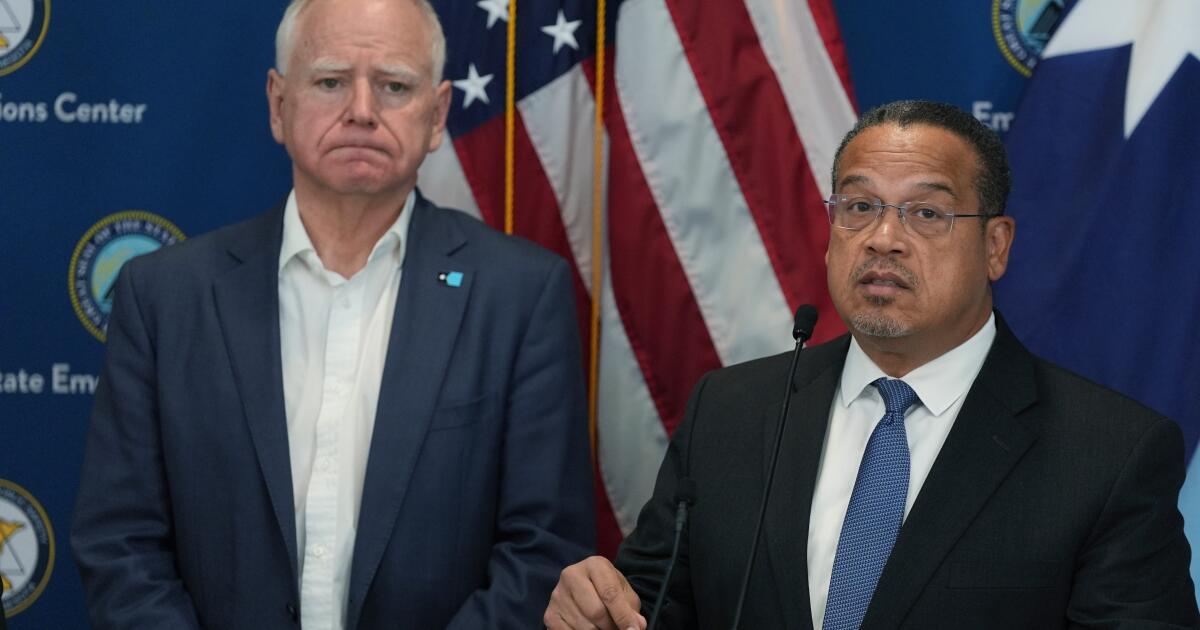A federal judge is set to hear arguments on Minnesota’s immigration crackdown after fatal shootings
MINNEAPOLIS — A federal judge will hear arguments Monday on whether she should at least temporarily halt the immigration crackdown in Minnesota that has led to the fatal shootings of two people by government officers.
The state of Minnesota and the cities of Minneapolis and St. Paul sued the Department of Homeland Security earlier this month, five days after Renee Good was shot by an Immigration and Customs officer. The shooting of Alex Pretti by a Border Patrol officer on Saturday has only added urgency to the case.
On Monday, President Trump said he is sending border czar Tom Homan to Minnesota. The president’s statement comes after Homeland Security Secretary Kristi Noem and Border Patrol Commander Gregory Bovino, who had become the public face of the administration’s crackdown, answered questions at news conferences over the weekend about Pretti’s shooting. Trump posted on social media that Homan will report directly to him.
Since the original court filing, the state and cities have substantially added to their original request in an effort to restore the order that existed before the Trump administration launched Operation Metro Surge in Minnesota on Dec. 1.
Democratic Minnesota Atty. Gen. Keith Ellison said he plans to attend.
The lawsuit asks U.S. District Judge Katherine Menendez to order a reduction in the number of federal law enforcement officers and agents in Minnesota back to the level before the surge and to limit the scope of the enforcement operation.
Justice Department attorneys have called the lawsuit “legally frivolous” and said “Minnesota wants a veto over federal law enforcement.” They asked the judge to reject the request or to at least stay her order pending an anticipated appeal.
Ellison said during a news conference Sunday that the lawsuit is needed because of “the unprecedented nature of this surge. It is a novel abuse of the Constitution that we’re looking at right now. No one can remember a time when we’ve seen something like this.”
It is unclear when the judge might rule.
The case has implications for other states that have been or could become targets of ramped-up federal immigration enforcement operations. Attorneys general from 19 states plus the District of Columbia, led by California, filed a friend-of-the-court brief supporting Minnesota.
“If left unchecked, the federal government will no doubt be emboldened to continue its unlawful conduct in Minnesota and to repeat it elsewhere,” the attorneys general wrote.
Menendez ruled in a separate case on Jan. 16 that federal officers in Minnesota can’t detain or tear gas peaceful protesters who aren’t obstructing authorities, including people who follow and observe agents.
An appeals court temporarily suspended that ruling three days before Saturday’s shooting. But the plaintiffs in that case, represented by the American Civil Liberties Union of Minnesota, asked the appeals court late Saturday for an emergency order lifting the stay in light of Pretti’s killing. The Justice Department argued in a reply filed Sunday that the stay should remain in place, calling the injunction unworkable and overly broad.
In yet another case, a different federal judge, Eric Tostrud, issued an order late Saturday blocking the Trump administration from “destroying or altering evidence” related to Saturday’s shooting. Ellison and Hennepin County Atty. Mary Moriarty asked for the order to try to preserve evidence collected by federal officials that state authorities have not yet been able to inspect. A hearing in that case is scheduled for Monday afternoon in federal court in St. Paul.
“The fact that anyone would ever think that an agent of the federal government might even think about doing such a thing was completely unforeseeable only a few weeks ago,” Ellison told reporters. “But now, this is what we have to do.”
Karnowski writes for the Associated Press.
